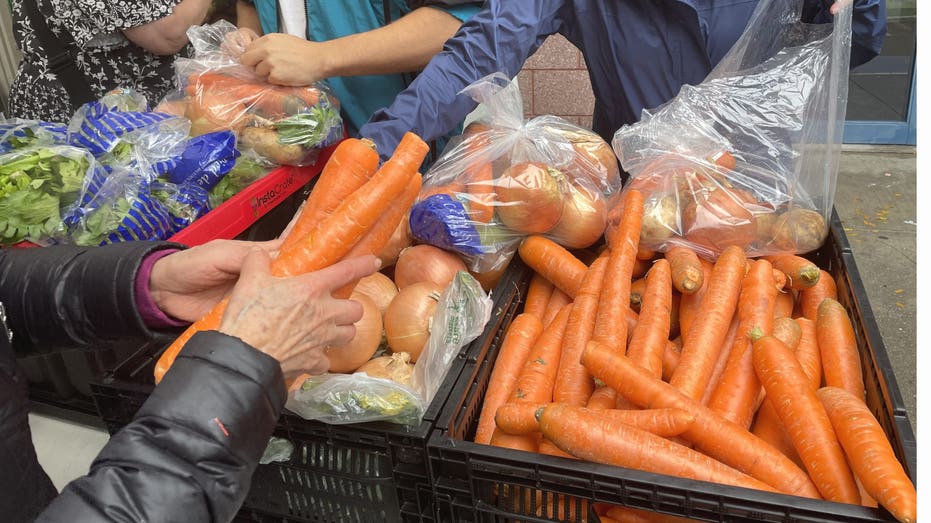
Rural or urban, rich or poor, escalating living costs and skyrocketing debts have placed an undue burden on Americans in battleground states, leaving local food banks grappling with record levels of need.
Residents of swing state Michigan – a key player in the 2024 presidential election – are no exception.
“The food prices in general, prices for basic needs have all been increasing to the point where many people that may not have needed to come for food assistance are now having to come to the Charitable Food Network for food assistance and, obviously, we’re seeing that through our service area here in West Michigan,” Ken Estelle, president and CEO of Feeding America West Michigan, told “America’s Newsroom,” Monday.
Data from the U.S. Bureau of Labor Statistics indicates the cost of grocery staples has increased dramatically – up 28% for bread, 41% for coffee, 30% for flour, 43% for ground beef, 37% for butter and a whopping 161% for eggs.
FOOD BANKS STRUGGLE AS MORE PEOPLE FACE FOOD INSECURITY
Thanks to hard economic times, paying off lofty debts and surviving inflation have translated to depleted savings, leaving families in a tight spot to put food on the table, thereby increasing demand at food banks.
Rising wages and lower unemployment rates have not mitigated the struggle, either.
Estelle’s organization, which serves 40 of Michigan’s 83 counties, reclaims safe, surplus food from various sources and works with local agencies like food banks to provide meals for local families in need. He said the need for food extends to both working families and the unemployed.
“I think we’re seeing a lot more first time people than we have in the past for sure, but we’re also seeing more people coming more often, so it’s not only just more households and people that are coming for help, but we’re seeing people that are coming more often because they’re running out of income or money sooner in the month than they have been before.”
AS HUNGER NUMBERS INCREASE, FOOD PANTRIES IN AMERICA MORE IMPORTANT THAN EVER
“Again, a lot of the folks that come are working, so it’s not just unemployed, but working families that are struggling,” he said.
According to Estelle, one truckload of supplies carrying enough food for up to 600 households sometimes isn’t enough to meet that higher demand, which has increased by 18% over the past year.
And families in Michigan aren’t alone.
A recent Wall Street Journal report cited officials from the Food Bank of Northern Nevada, who serve 155,000 people monthly across the northern part of the state – a 70% increase from 2019 numbers.
Food banks in central Pennsylvania are reportedly serving as many as 275,000 individuals a month, thanks to financial hardships many families face, according to an NBC News report.
Estelle told the outlet of his own region’s crisis: “We have never seen this level of need in the 43 years we have been serving this community. It is significantly higher than during COVID and has pressed us beyond our capacity.”
“We’ve just seen this drumbeat increase every month of more people and more people.”
The economy remains a divisive topic for voters heading into Tuesday’s faceoff between former President Donald Trump and Vice President Kamala Harris, with voters expected to choose between two paths forward for economic policy.
Estelle said those eager to help those struggling to provide for their families can volunteer with local food banks or offer financial support.
Rural or urban, rich or poor, escalating living costs and skyrocketing debts have placed an undue burden on Americans in battleground states, leaving local food banks grappling with record levels of need.
Residents of swing state Michigan – a key player in the 2024 presidential election – are no exception.
“The food prices in general, prices for basic needs have all been increasing to the point where many people that may not have needed to come for food assistance are now having to come to the Charitable Food Network for food assistance and, obviously, we’re seeing that through our service area here in West Michigan,” Ken Estelle, president and CEO of Feeding America West Michigan, told “America’s Newsroom,” Monday.
Data from the U.S. Bureau of Labor Statistics indicates the cost of grocery staples has increased dramatically – up 28% for bread, 41% for coffee, 30% for flour, 43% for ground beef, 37% for butter and a whopping 161% for eggs.
FOOD BANKS STRUGGLE AS MORE PEOPLE FACE FOOD INSECURITY
Thanks to hard economic times, paying off lofty debts and surviving inflation have translated to depleted savings, leaving families in a tight spot to put food on the table, thereby increasing demand at food banks.
Rising wages and lower unemployment rates have not mitigated the struggle, either.
Estelle’s organization, which serves 40 of Michigan’s 83 counties, reclaims safe, surplus food from various sources and works with local agencies like food banks to provide meals for local families in need. He said the need for food extends to both working families and the unemployed.
“I think we’re seeing a lot more first time people than we have in the past for sure, but we’re also seeing more people coming more often, so it’s not only just more households and people that are coming for help, but we’re seeing people that are coming more often because they’re running out of income or money sooner in the month than they have been before.”
AS HUNGER NUMBERS INCREASE, FOOD PANTRIES IN AMERICA MORE IMPORTANT THAN EVER
“Again, a lot of the folks that come are working, so it’s not just unemployed, but working families that are struggling,” he said.
According to Estelle, one truckload of supplies carrying enough food for up to 600 households sometimes isn’t enough to meet that higher demand, which has increased by 18% over the past year.
And families in Michigan aren’t alone.
A recent Wall Street Journal report cited officials from the Food Bank of Northern Nevada, who serve 155,000 people monthly across the northern part of the state – a 70% increase from 2019 numbers.
Food banks in central Pennsylvania are reportedly serving as many as 275,000 individuals a month, thanks to financial hardships many families face, according to an NBC News report.
Estelle told the outlet of his own region’s crisis: “We have never seen this level of need in the 43 years we have been serving this community. It is significantly higher than during COVID and has pressed us beyond our capacity.”
“We’ve just seen this drumbeat increase every month of more people and more people.”
The economy remains a divisive topic for voters heading into Tuesday’s faceoff between former President Donald Trump and Vice President Kamala Harris, with voters expected to choose between two paths forward for economic policy.
Estelle said those eager to help those struggling to provide for their families can volunteer with local food banks or offer financial support.



